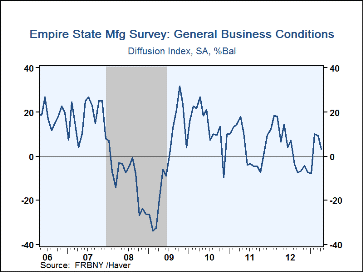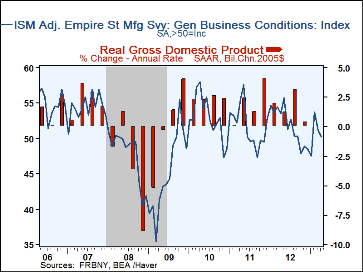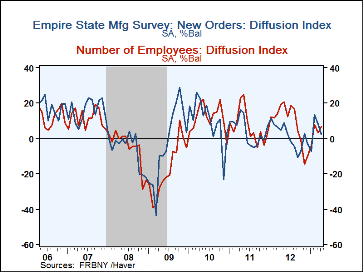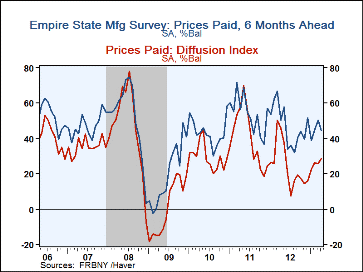 Global| Apr 15 2013
Global| Apr 15 2013Empire State Factory Index Deteriorates
by:Tom Moeller
|in:Economy in Brief
Summary
Forward momentum in factory sector activity is losing steam. The Federal Reserve Bank of New York reported that the Empire State Factory Index of General Business Conditions declined to 3.05 this month from an unrevised 9.24 in March. [...]
Forward momentum in factory sector activity is losing steam. The Federal Reserve Bank of New York reported that the Empire State Factory Index of General Business Conditions declined to 3.05 this month from an unrevised 9.24 in March. The figure follows its recent rise to 10.04 in February. Any number above 50 indicates positive growth in factory sector activity. The latest fell short of Consensus expectations for 7.0. Based on these figures, Haver Analytics calculates an index that is compatible to the ISM series. The adjusted figure fell to 50.2. Though down sharply for two months, it continued to indicate positive growth. Since inception in 2001, the business conditions index has had a 65% correlation with the quarterly change in real GDP.
Weakness in the overall index was paced by lower shipments and new orders readings. Unfilled orders and delivery times fell as well. To the upside was employment. During the last ten years there has been a 76% correlation between the jobs index and the m/m change in factory sector payrolls. Also gaining ground were the inventories and employee workweek figures.
The prices paid reading also improved to 28.41, its highest level since May. Thirty two percent of respondents reported paying higher prices while three percent paid less. During the last ten years there has been a 64% correlation between the index and the 3-month change in the intermediate goods PPI.
Looking ahead, the Empire State index of expected business conditions in six months slipped to 31.95 and reversed two months of increase. Lower readings for shipments and prices received offset higher indexes for new orders, the number of employees and capital expenditures.
The Empire State figures are diffusion indexes which are calculated by subtracting the percent of respondents reporting poorer business conditions from those reporting improvement. Thus, they have a good correlation with growth in the series covered. The data is available in Haver's SURVEYS database. The ISM-adjusted headline index is calculated by Haver Analytics. The series date back only to 2001. The Consensus expectation figure is in Haver's AS1REPNA database.
| Empire State Manufacturing Survey | Apr | Mar | Feb | Apr'12 | 2012 | 2011 | 2010 |
|---|---|---|---|---|---|---|---|
| General Business Conditions (ISM Adjusted) | 50.2 | 51.2 | 53.7 | 53.5 | 51.8 | 51.8 | 52.9 |
| General Business Conditions (Diffusion Index, %) | 3.05 | 9.24 | 10.04 | 6.40 | 4.24 | 4.47 | 13.86 |
| New Orders | 2.20 | 8.18 | 13.31 | 4.81 | 1.38 | 4.04 | 9.96 |
| Shipments | 0.75 | 7.76 | 13.08 | 4.51 | 11.13 | 9.51 | 11.75 |
| Unfilled Orders | -3.41 | -2.15 | -2.02 | -7.23 | -8.83 | -5.29 | -6.58 |
| Delivery Time | -3.41 | -2.15 | 2.02 | 4.82 | -0.30 | -0.91 | -2.87 |
| Inventories | -4.55 | -5.38 | 0.00 | 1.20 | -2.91 | -1.80 | -1.48 |
| Number of Employees | 6.82 | 3.23 | 8.08 | 19.28 | 8.62 | 6.68 | 14.29 |
| Prices Paid | 28.41 | 25.81 | 26.26 | 45.78 | 24.71 | 40.66 | 29.63 |
Tom Moeller
AuthorMore in Author Profile »Prior to joining Haver Analytics in 2000, Mr. Moeller worked as the Economist at Chancellor Capital Management from 1985 to 1999. There, he developed comprehensive economic forecasts and interpreted economic data for equity and fixed income portfolio managers. Also at Chancellor, Mr. Moeller worked as an equity analyst and was responsible for researching and rating companies in the economically sensitive automobile and housing industries for investment in Chancellor’s equity portfolio. Prior to joining Chancellor, Mr. Moeller was an Economist at Citibank from 1979 to 1984. He also analyzed pricing behavior in the metals industry for the Council on Wage and Price Stability in Washington, D.C. In 1999, Mr. Moeller received the award for most accurate forecast from the Forecasters' Club of New York. From 1990 to 1992 he was President of the New York Association for Business Economists. Mr. Moeller earned an M.B.A. in Finance from Fordham University, where he graduated in 1987. He holds a Bachelor of Arts in Economics from George Washington University.










